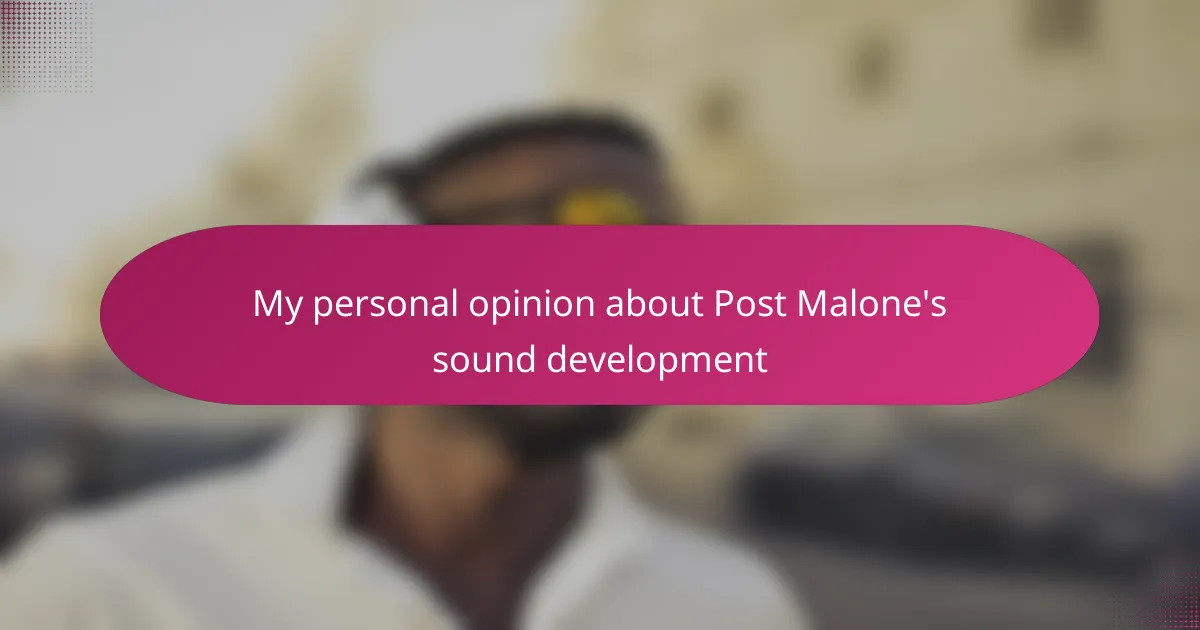Key takeaways
- Post Malone’s music seamlessly blends hip-hop, rock, and pop, offering catchy hooks while exploring introspective themes.
- His sound evolution features increased pop influences and genre experimentation, reflecting personal growth and a desire to push musical boundaries.
- The emotional depth in his lyrics and the use of autotune as an expressive tool contribute to a sense of vulnerability and authenticity in his work.
- Post Malone’s musical journey encourages fans to embrace change and appreciate rap as a fluid, evolving art form rather than a fixed genre.
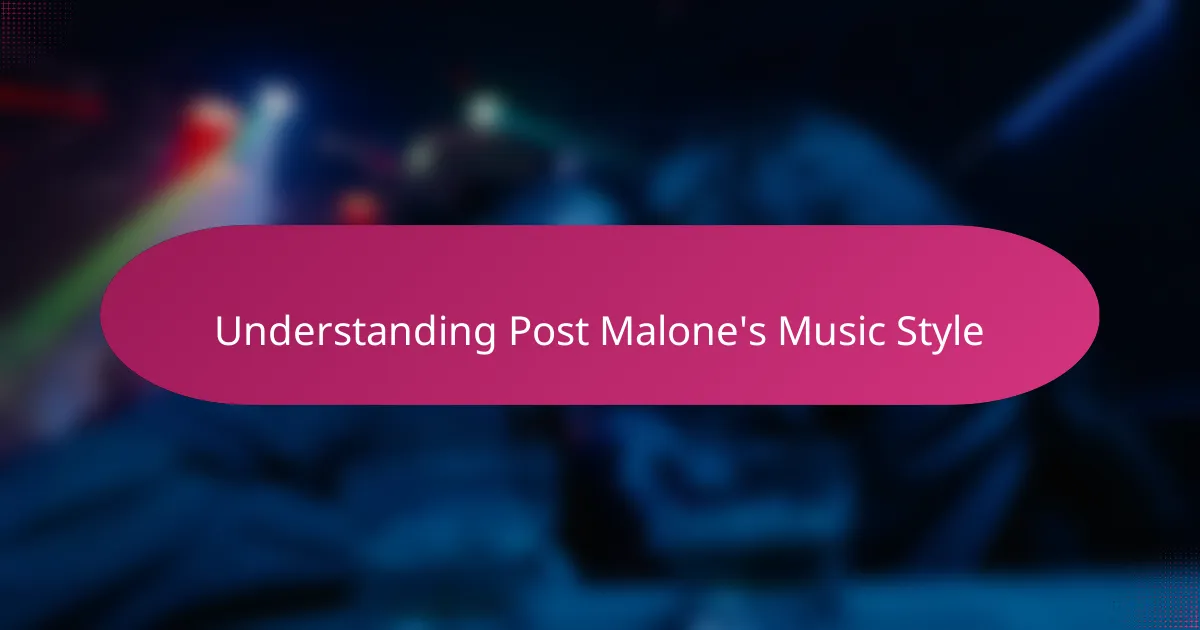
Understanding Post Malone’s Music Style
When I first listened to Post Malone, I was struck by how effortlessly he blends genres. His music isn’t just rap; it’s a fusion of hip-hop, rock, and even pop melodies, creating a sound that feels both familiar and fresh. Have you noticed how his voice carries a certain vulnerability that makes his songs hit differently?
What fascinates me is how he uses autotune—not just as a tool for pitch correction, but as an emotional instrument. It adds a raw edge that mirrors the complexity of his lyrics, making you feel like you’re hearing his unfiltered thoughts. This approach has shaped how I think about vocal effects in rap music—it’s not just about sound, but about expressing authenticity.
Moreover, Post Malone’s style often revolves around catchy hooks paired with introspective themes, which is a combination that’s surprisingly uncommon in mainstream rap. It made me wonder, why don’t more artists dare to balance commercial appeal with emotional depth? His sound development challenges the boundaries, and that’s what makes his music so compelling to me.

Evolution of Rap Music Sounds
Rap music has come a long way from its early days of simple beats and rhymes. I remember when the focus was mostly on lyrical skill and hard-hitting rhythms, but over the years, sounds have become much more experimental and genre-blending. It’s like rap opened its doors to different musical influences, creating a richer and more diverse soundscape.
Sometimes I ask myself, what sparked this evolution? From boom bap to trap and then to melodic rap with autotune, the changes feel like artists are continuously pushing their creative limits. This progression has made the genre more accessible and emotionally varied, allowing listeners to connect on deeper levels than before.
Reflecting on this journey, I see how the evolution isn’t just about music styles but about storytelling and mood. Each era of rap brings a new way to express identity and struggle, and that’s powerful. It makes me appreciate artists who don’t just follow trends but shape the sound to reflect their own truths.
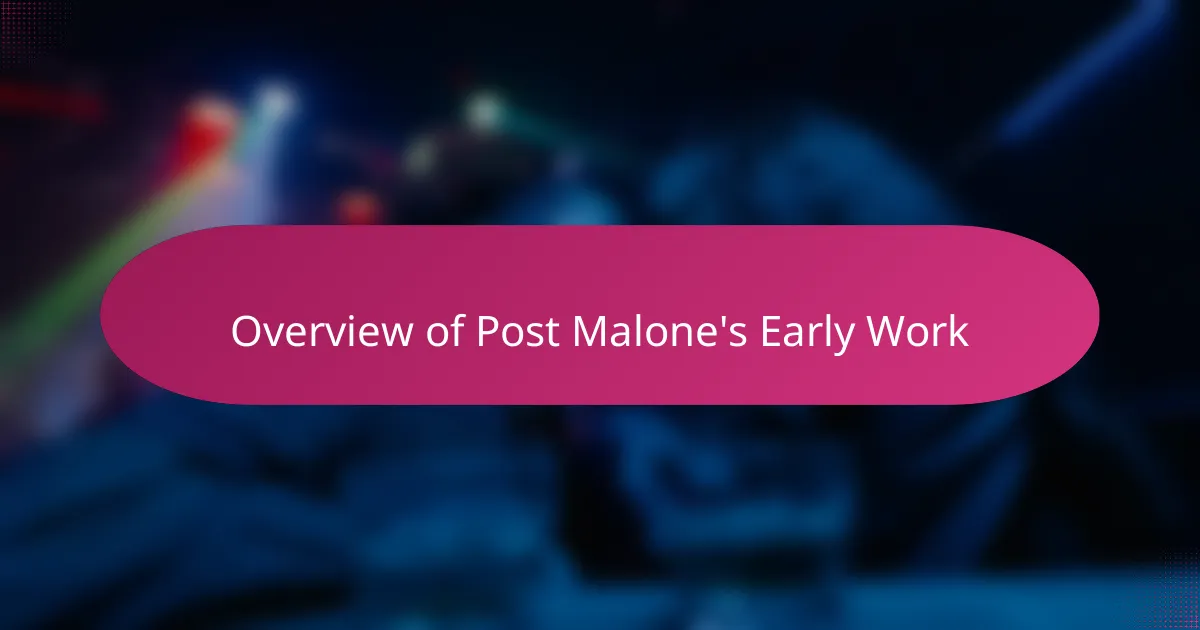
Overview of Post Malone’s Early Work
I remember the first time I heard Post Malone’s early tracks like “White Iverson”—there was this raw simplicity that immediately caught my attention. His voice sounded both laid-back and heartfelt, which was refreshing compared to the more aggressive styles dominating rap at the time. It felt like he was inviting us into his world, rather than just showing off his skills.
What stood out to me was how he didn’t stick strictly to rap conventions. Instead, he layered melodic elements that gave his songs a haunting, almost vulnerable quality. Have you ever noticed how his early work balances that space between confidence and melancholy? It’s a tricky line to walk, and yet he managed it effortlessly.
Looking back, I think his early sound hinted at the evolution to come but stayed grounded in a kind of honest storytelling. Those initial songs weren’t just about catchy beats—they reflected moments of introspection and uncertainty, which made them resonate deeply with a wide audience. It’s that blend of openness and musical experimentation that I find truly compelling in his early work.
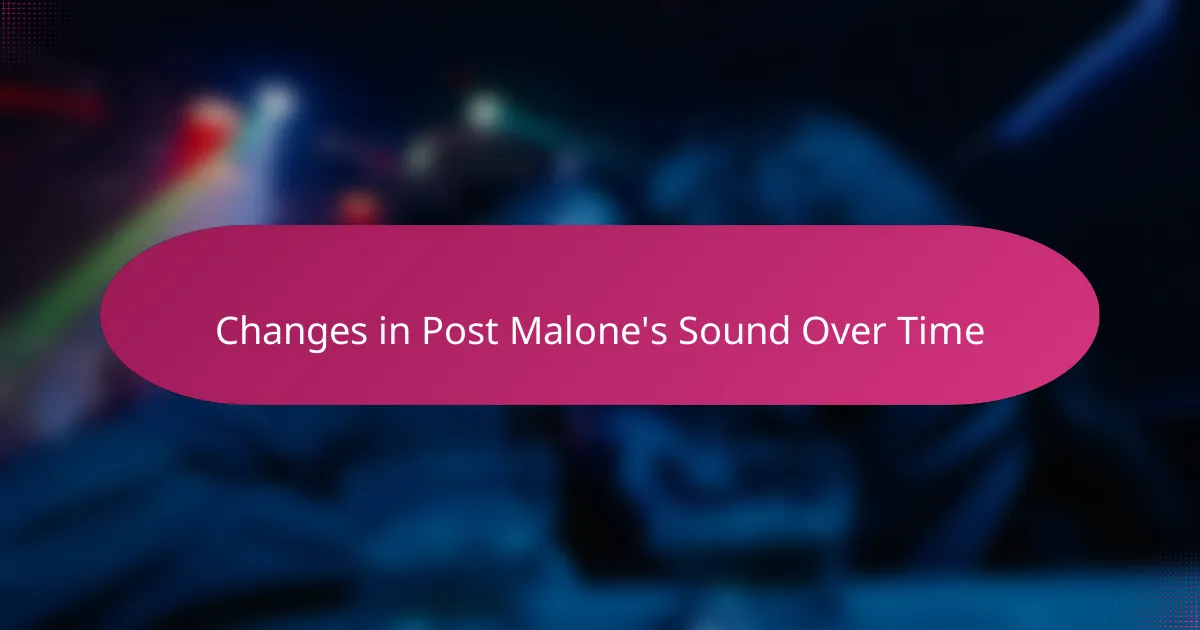
Changes in Post Malone’s Sound Over Time
It’s interesting to me how Post Malone’s sound has shifted noticeably since those early tracks. As his music matured, I began to hear a stronger pop influence weaving through the hip-hop foundation, making his songs more polished yet still emotionally charged. Have you noticed how his voice sometimes carries a smoother, almost effortless vibe now, compared to the rawness of his earlier work?
Over time, Post Malone seems to have embraced a broader palette of sounds, incorporating rock guitar riffs and even some country touches. From my perspective, this evolution shows his desire to break away from genre constraints and try new textures, which keeps his music feeling fresh and unpredictable. I wonder if this fearlessness to experiment is what keeps his fanbase growing despite changing trends?
That said, there’s also a subtle shift in the emotional tone of his music as he develops. Earlier, his songs felt like intimate confessions, vulnerable and personal, while his newer tracks sometimes lean toward anthemic and anthemic, almost larger-than-life. For me, this transition raises the question: Has Post Malone’s sound grown to reflect not just his personal journey but also his experience navigating fame on a grander scale?
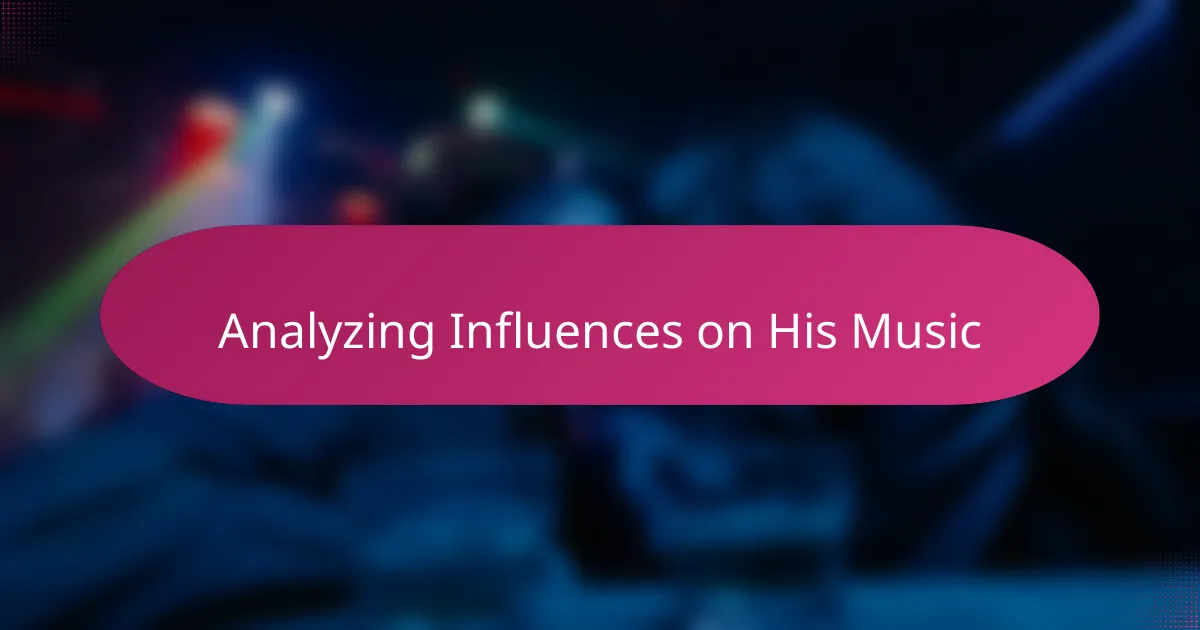
Analyzing Influences on His Music
One thing I keep coming back to when analyzing Post Malone’s influences is how he draws from such a wide array of genres. It’s as if his playlist spans from classic rock legends to modern hip-hop icons, and you can hear bits of each era and style woven into his songs. I often wonder how much of his sound comes from artists he grew up listening to versus those he discovered as his career evolved.
I’ve noticed that Post Malone’s music carries a blend of vulnerability and bravado, which seems directly influenced by the emotional honesty found in singer-songwriters outside of rap. It’s a rare quality in hip-hop, and I think it’s what makes his songs feel so relatable on a personal level. Have you ever felt that his lyrics sound like conversations you might have with a close friend?
From my experience listening to his albums, it’s clear that Post Malone doesn’t just follow musical trends; he absorbs and reinterprets them in his own way. This willingness to merge diverse influences—whether it’s the melancholy of indie rock or the swagger of trap—is what makes his evolution feel organic rather than forced. I find that refreshing because it’s a reminder that influence isn’t imitation; it’s a starting point for creating something new.
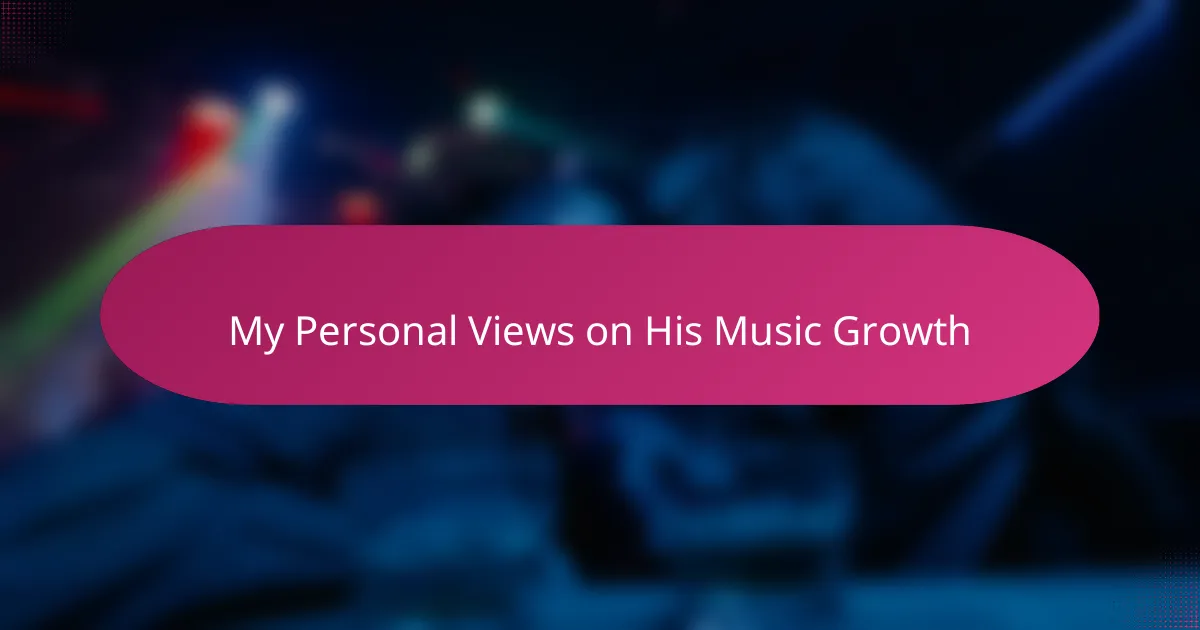
My Personal Views on His Music Growth
What really stands out to me about Post Malone’s musical growth is how intentional it feels, like he’s carefully crafting each phase rather than just chasing hits. He’s evolved from that raw, intimate sound I first connected with into something more expansive, yet he hasn’t lost that emotional core. Have you ever noticed how even as his production becomes bigger, there’s still a genuine feeling behind his vocals that pulls you in?
Sometimes I think about how his experimentation with different sounds mirrors his own journey—trying on new styles but staying true to himself. It’s like watching an artist stretch their wings but not forget where they came from. Personally, that kind of growth feels authentic to me, not like he’s just following trends but letting his experiences shape his music naturally.
It also makes me wonder how much of this progression is influenced by his life changes and fame. As someone who’s followed his career, I’ve felt a shift from the vulnerable confessions in his early work to a more anthemic, confident presence in his newer tracks. Does that reflect how he’s grappling with his success, or is it just part of his artistic evolution? Either way, it keeps me curious and invested every time he releases something new.
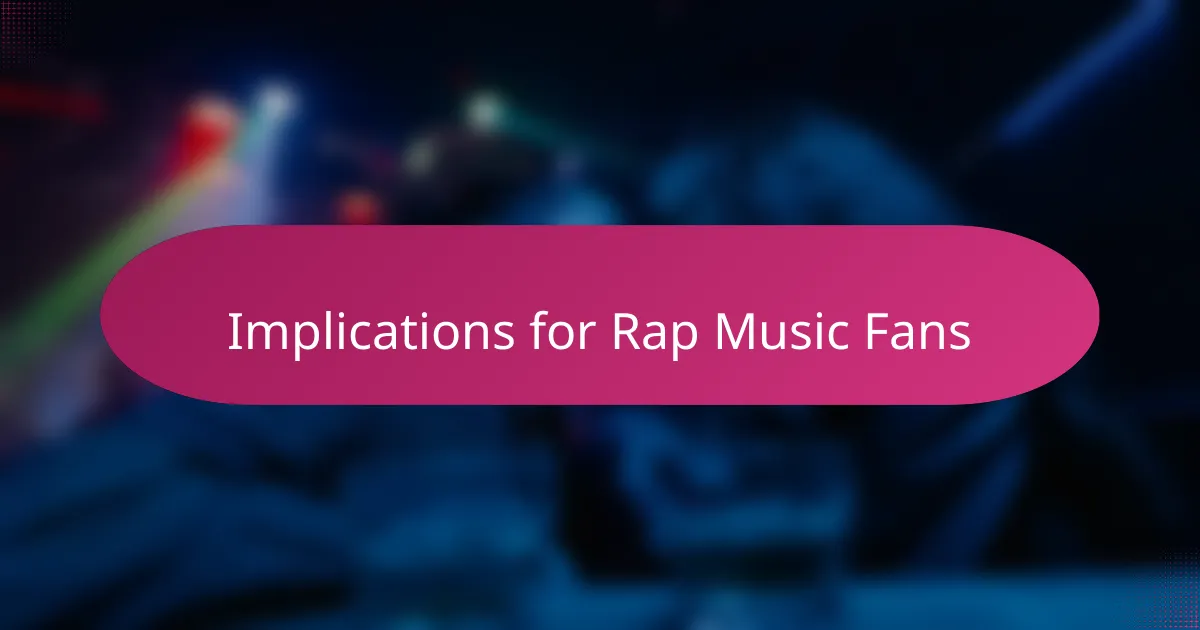
Implications for Rap Music Fans
For rap music fans like me, Post Malone’s sound development opens up a whole new way to experience the genre. Have you ever felt limited by strict definitions of what rap “should” sound like? His fusion of styles challenges that boundary, inviting us to appreciate rap as a fluid, evolving art form rather than a fixed formula.
I find that his blend of emotional vulnerability and genre experimentation offers fans a deeper connection to the music. When I listen to his tracks, it feels like I’m not just hearing clever wordplay but getting a glimpse into complex feelings—a rarity in mainstream rap that makes his music resonate on a personal level.
That said, some fans might feel conflicted as Post Malone moves further from traditional rap roots. But isn’t part of being a fan about embracing change and growth? I think his evolving sound encourages us to expand our own musical tastes and be open to new expressions within the rap community.
